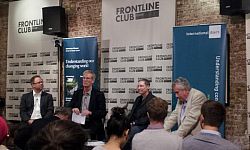Expert speakers debate war and peacebuilding in journalism
A panel of expert speakers came together in London this week to discuss how the media depicts stories of war and peace, at an event organised by the School of Global Studies in partnership with one of the world’s leading peacebuilding charities.
 Expert speakers debated how the media tells stories of war and peacebuilding at the third Peace Talks event. Credit: Clare Richards
Expert speakers debated how the media tells stories of war and peacebuilding at the third Peace Talks event. Credit: Clare Richards
The School joined forces with International Alert on Wednesday (18 September) to host the third debate in the Peace Talks series, titled ‘War and peace in journalism – does the devil have the best stories?’.
Professor Dan Smith, Secretary General for International Alert, chaired the public discussion, held for the first time at the Frontline Club - a media club that champions independent journalism and freedom of the press worldwide.
The panel was completed by:
- Martin Bell OBE, a veteran war correspondent and British ambassador for UNICEF;
- Timothy Large, Editor-in-Chief at Thomson Reuters Foundation;
- and Professor Cynthia Weber, Professor of International Relations at the University of Sussex.
The debate began with a discussion of why stories of war are prioritised by the media, while stories of peacebuilding and reconciliation usually fall off the news agenda.
Professor Weber suggested that stories are often selected by media organisations on the assumption that peace is the norm or a non-event.
Timothy Large agreed, stating: “News essentially is about something new. Peace is an open-ended thing; there are no clear milestones. The challenge for journalists, remembering that they have to connect with their audience, is to find ways to make stories about peace and the process resonate.”
Martin Bell argued, however, that many wars also remain unreported. He said: “War reporters are being driven out … what we used to do is no longer possible.”
Discussion also turned to the current crisis in Syria and why media organisations and journalists are overwhelmingly reliant on amateur video footage or social media in their reports of the war.
Arguing that it is a case of access, Timothy Large said: “It’s extremely difficult to report from the ground in Syria. Often the most compelling evidence we have of what’s going on in the country is unverified footage and social media, but it’s the only thing there is.
“The sheer feat of reporting in a situation like Syria can’t be underestimated. It’s tough.”
Professor Weber, in response, added that access isn’t the only cause for this overreliance – the desire for a first-person account is also involved.
A video of the debate is available on the International Alert website and a tweetfeed of the event can be found online.
